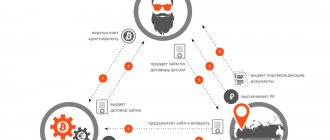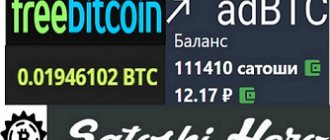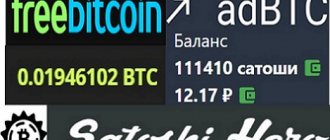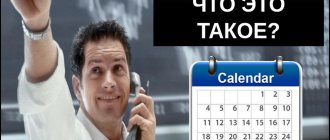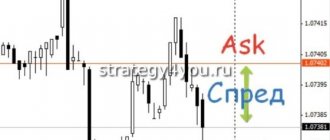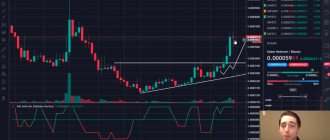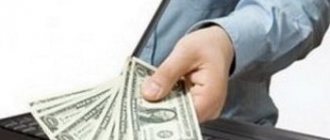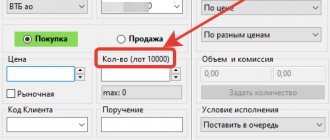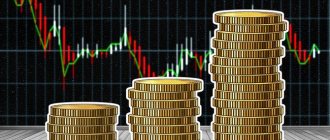Greetings, seekers of making money on Forex.
Thanks to high liquidity, 24/7 trading and easy access to the market, trading has become a popular profession, especially for people who are financially savvy. The prospects are tempting - who doesn’t want to be their own boss and earn money using a laptop.
However, Forex trading is an activity full of its own disadvantages and pitfalls. According to statistics, 80% of beginners lose money precisely because of poor knowledge of Forex. Let's not repeat their bad example and study everything in detail.
What is Forex in simple words
To put it simply, Forex is a global market where currencies are traded, exchanging one for another at a free market rate. Currencies are traded against each other in pairs, in which one currency (base) is purchased for another (quote).
The market is traded by private traders who want to make money on speculation, businesses (settlements with foreign partners are simplified) and even entire states represented by central banks.
Brief history of appearance
The prototype of the Forex market arose during the appearance of the first money. Monetary interactions and the need for adequate currency exchange arose in the era of the Babylonians. At the same time, the tradition of minting money from precious metals (mainly silver and gold) was established. The tradition of tying the national currency to gold was widely used until the 20th century.
But this is all too far. The Forex market as such emerged in the 1980s. Prior to this, global currency transactions were regulated by the Bretton Woods agreements adopted after the end of World War II and the standards of the International Monetary Fund and the World Bank created at the same time.
Hurry up to take advantage of the doubling of the tax deduction until December 31, 2022.
They were revised in 1971, resulting in the birth of the modern version of the foreign currency exchange platform.
Until the 2000s, it was a relatively closed market, accessible only to institutional investors, large corporations and qualified traders. But the Internet boom quickly resolved this situation with Forex, and now you can start trading directly from your smartphone, while sitting in a minibus or in class at the university.
Principle of operation
The principles of Forex are clear: the foreign exchange market is a place where currencies are traded. More precisely, they trade currency pairs, buying one currency for another. Foreign exchange is important to most people around the world, whether they realize it or not.
For example, to buy champagne from France, our supermarket must make an international currency exchange. After all, he needs to pay the French in euros. The same goes for travel.
A Russian tourist in Egypt cannot pay in rubles to see the pyramids because it is not the local currency. Thus, the tourist must exchange the ruble for the local currency, in this case the Egyptian pound, at the current exchange rate.
One of the unique aspects of this international market is that Forex is completely free and decentralized. There is no single exchange that sets the trading schedule and rules. All transactions occur through computer networks between traders around the world. The market is open 24 hours a day, five days a week, and currencies are traded all over the world.
Forex exchange from a trader's perspective
For a trader, Forex is both the main means of earning money and a field for creative activity.
Traders have a pragmatic interest in profiting from fluctuations in exchange rates, but to do this they need observation, imagination, and the ability to analyze and find cause-and-effect relationships. As for me, this is simply a huge field for personal and professional growth.
Geography of the foreign exchange market
The Forex market is the largest financial market in the world. Trading is carried out not in one place, but between all participants simultaneously through intermediary brokers. The market is open 24 hours a day in different parts of the world. The very essence of Forex is initially such that traders can instantly satisfy their needs in currency at any time.
Differences from other markets
Main:
- Forex structure. Stock markets are traded on stock exchanges such as the New York Stock Exchange (NYSE). In Forex, participants trade directly with each other through intermediaries - brokers.
- Entry threshold. There is no leverage for trading stocks or bonds, so you usually need a lot more money to get started. Forex uses leverage. This is both beneficial and disadvantageous. It’s profitable because with a leverage of 1000:1, every dollar you have on deposit allows you to buy $1000 worth of currencies. Unprofitable, because with such leverage, even a couple of pips of drawdown will empty the balance.
- Method of trading. In the stock market, you make a transaction by selling or buying an asset. In Forex you buy and sell at the same time. Currency pairs form an instrument. Speculation occurs when we correctly predict when one currency will rise or fall.
Working hours
Since Forex is not limited to one exchange, trading does not stop all week except Saturday and Sunday.
But given that there are several large financial centers on the planet, global trading can be divided into sessions:
- New York (8:00-17:00 EST/13:00-22:00 UTC).
- Tokyo (19:00-4:00 EST/12:00-9:00 UTC).
- Sydney (7:00-2:00 EST/22:00-7:00 UTC).
- London (3:00_12:00 EST/from 20:00 to 17:00 UTC).
The two busiest are London and New York. The period when these two trading sessions overlap London midday and New York morning is the busiest, accounting for 70% of all trading volume.
Turnover
Forex is the largest financial market on the planet. The daily volume of the global stock market is ~$84 billion. Forex - $5.1 trillion. There is no need to add anything else. Moreover, these figures are the result of a World Bank study for 2016. Current figures will no doubt be even more impressive.
Warning about Forex and binary options
Expert opinion
Vladimir Silchenko
Private investor, stock market expert and author of the Capitalist blog
Ask a Question
For the amateur and the common man, seduced by advertising and cool promos, binary options trading and Forex are not much different. For them, this is just one of the options for cutting down cabbages. That is, to get into the money, because if you don’t know what’s what, you won’t earn much.
When trading Forex, you operate with real currency, which is on your deposit. Started, traded, withdrawn - money is involved everywhere. When trading BO and opening a deal, you are not operating with anything. Naked quotation. In fact, I gave the money for nothing - just like a bet in a casino.
Legend has it that the binary nature of BO gives an equal 50/50 chance of success that the price will fall or rise. But in fact, a successful deal brings 50/60/70% profit. Unsuccessful - 100% loss. If you spent money and did not become the owner of a valuable asset, you were deceived.
Answers to frequently asked questions ⁉
When studying Forex, novice traders have a huge number of questions. Finding answers to them can take a lot of time. That is why we consider the most popular questions below.
Question 1. How does trading take place on the Russian foreign exchange market?
In the Russian foreign exchange market, trading is mainly carried out through the system of foreign exchange exchanges.
It includes:
- VR MB (Moscow Exchange Foreign Exchange Market);
- SPEB (St. Petersburg Currency Exchange);
- SICE (Siberian Interbank Currency Exchange);
- ATICEX (Asia-Pacific Interbank Currency Exchange);
- URVB (Ural Regional Currency Exchange), etc.
Recently, there has also been an active development of the over-the-counter interbank foreign exchange market. However, today it is limited only to the capital of our country. The fact is that in Moscow there is a high level of concentration of credit institutions, as well as the development of the interbank credit market.
The competitive advantages of this part of the foreign exchange market are as follows:
- high↑ speed of foreign exchange transactions;
- low↓ transaction costs due to the absence of exchange commissions and city fees.
Question 2. What is a spread in Forex?
People often ask about spreads: what is it in Forex? Translated from English, “spread ” means “ scatter”. However, from a financial point of view, the following definition corresponds to a spread.
Spread is the difference between the purchase rate ( ask ) and sale rate ( bid ) of currency pairs.
Spread on Forex: example
The size of the spread determines the level of liquidity of the market: the larger it is↑, the less↓ the liquidity. That is why Forex has a small spread for popular currency pairs (it is a broker’s commission).
Take note! When opening a position on Forex on a transaction, the trader immediately incurs a loss that is equal to the amount of the spread. In order for such a transaction to move to the break-even point, the rate must travel in the direction of the transaction the number of points that make up the spread value. Making a profit requires the movement to continue.
At its core, a spread on Forex is a commission that is automatically debited from the trader’s account at the time of opening a transaction. For honest brokers, the spread is the main source of income .
Question 3. Where are transactions carried out on the US foreign exchange market?
In the American foreign exchange market, transactions with currencies are carried out on exchanges that specialize in forward trading of currencies and financial assets:
- Mercantile Exchange (CME);
- Options Exchange (CBOE);
- FINEX/FINEX Europe (NYCE Division);
- New York Futures Exchange (NYFE).
New York is the second largest international financial center (London is the largest). Its main formation took place in the period from 1914 to 1945 . The reason for the active development of New York as a financial center was the development of the American national economy. Today, the average turnover of the foreign exchange market here is at the level of 200 billion dollars per day.
Question 4. What is margin on Forex in simple words?
When beginners come to the Forex market, they dream of learning how to trade and earning a good income. However, in most cases, they do not have a large amount of money to deposit into the account. In such a situation, it seems that you won’t be able to earn much.
In fact, even if you have a minimum initial capital (several tens of dollars), you can start playing on the stock exchange. With a competent approach, after a certain amount of time it is quite possible to increase this amount several times.
Trading with a small amount of funds is allowed in Forex thanks to the existence of margin trading . It refers to the implementation of trading using borrowed funds. All modern dealership centers operate on its principles today.
When using margin secured by funds deposited, the broker provides the trader with a loan. Thus, it turns out that trading is carried out not with one’s own money, but with borrowed money.
As a result, the trader has the opportunity, with a small capital, to enter into transactions for fairly large sums of money. In this case, the loan can exceed the amount on deposit many times. This allows the trader to achieve profits that are noticeable even with small investments.
Margin is the collateral required to obtain a loan from a brokerage company. Its size is directly dependent on the selected leverage value
It is important to understand: the amount of leverage is determined already at the stage of account registration. Subsequently, it is this value that will influence the size of the margin for each transaction. Moreover, the size of the result (profit or loss) when using the same lot, as well as the same currency pair, depends on the leverage.
The leverage value can be set from 1:10 to 1:1000 . The larger↑ this value, the smaller↓ the amount the margin will be.
The funds that a trader deposits into his account are called collateral or protective deposit . The brokerage company places them on site in case the trader begins to receive losses. In case of maximum drawdown, all the trader’s funds will be transferred to the broker.
Question 5. What news affects the Forex market?
The Forex market is influenced not only by its main participants, but also by various events and factors. It is important for a trader to know and take them into account in the trading process. First of all, this concerns news.
Without a doubt, major news in the fields of finance, economics, politics and business can have a strong impact on the exchange rates of the respective country. Moreover, this also indirectly affects the value of other monetary units.
At the same time, an important rule applies here: the more stable the economy of a certain state, the more predictable is the reaction to the news of its national currency.
It turns out that if you regularly study the news of a particular country in conjunction with an analysis of its impact on the exchange rate, you can learn to make accurate forecasts regarding market movements.
The most important news affecting the Forex market:
- reports on GDP and unemployment;
- consumer and industrial price indices;
- reports on wages and housing construction;
- budget approval;
- speech by state leaders.
News may be published in various sources. In most cases, they are published in the language of the country they belong to.
Naturally, one person cannot physically track all the news. In this case, you can miss the most important event that will have a colossal impact on the exchange rate. This is why it is important for a news trader to take into account the opinions of financial analysts.
The main task of such specialists is to filter the most important news. However, the trader must be able to analyze the news himself. After all, an analyst is a living person who can make mistakes. Therefore, you should not blindly trust his opinion. We also recommend reading the article “How to make a forecast and analysis of the dollar exchange rate.”
Question 6. What is a swap in Forex?
It is important for a trader to understand what a swap is and how it works, because this value has a direct impact on the amount of profit received.
In the Forex market, a swap is a fee for transferring an open position to the next day. overnight and rollover are often used in relation to this concept .
The swap is well known to traders who trade in the medium and long term. The fact is that in Forex there is an important rule: the seller is obliged to transfer the currency he purchased to the buyer on the next trading day.
To resolve the situation with open positions that are carried over to the next day, you have to close the order at the end of the day, and at the beginning of the next day, open exactly the same one.
When carrying out the manipulations described above, the trader receives:
- spread loss;
- interest on the use of currency.
Depending on which value is greater, the swap can be positive or negative .
What is traded on Forex
What do you trade on Forex? The answer is simple - MONEY. Or rather, as we already know, currency pairs. For example, we spend a euro to buy a dollar.
The price of a currency is usually a direct reflection of the market's (yes, that horde of bears and bulls) opinion about the current and future state of a country's economy. So if a stock gives a stake in a company, a currency pair with the yen gives a kind of “stake” in the Japanese and US economies. But these are not all options.
Currencies
Forex quotes are the rate at which one currency can be exchanged for another. It is always quoted in pairs such as EUR/USD (Euro and US Dollar).
Exchange rates fluctuate depending on economic factors such as inflation, industrial production and geopolitical events. These factors will influence whether you buy or sell a currency pair in Forex.
Metals
There are many ways to trade metals. The most popular today is CFD. In this case, we buy the monetary equivalent of the metal, but actually acquire the raw material itself. Many brokers today trade CFDs with base currencies.
World indices
Contracts for difference (CFDs) also allow you to work with stock indices (for example, the S&P 500 index on the NYSE, which reflects an entire industry sector). Trading also involves the use of leverage. This means that, for example, with a leverage of 1000:1 per thousand on the account, we can open a deal for 10,000. So, remember about losses.
Exchange rate and currency pairs
Forex trading is the exchange of one currency for another, and the price at which the exchange occurs is called the exchange rate. You are very familiar with this concept, since you probably follow the dollar exchange rate.
Each currency in Forex is designated by a three-letter English combination, for example:
- USD - US dollar
- EUR - euro
- GBP - British pound
- CHF - Swiss franc
- JPY - Japanese yen
- CAD - Canadian dollar
- AUD - Australian dollar
- NZD - New Zealand dollar
And the trading itself is carried out according to quotes of currency pairs, which indicate the exchange process, for example EURUSD - exchange of euros for dollars. The exchange rate of this pair is expressed in the amount of the second currency that must be given to exchange for a unit of the first.
The EURUSD exchange rate of 1.1535 means that to buy 1 euro you need to pay 1.1535 US dollars.
In total, more than 20 currencies are traded on the Forex market, which make up more than 70 traded currency pairs. Here are the most popular:
In recent years, Forex brokers have been actively adding trading in crypto assets: Bitcoin, Ethereum and other coins. Crypto pairs are highly volatile and attractive to traders.
The exchange rate of a currency pair is constantly changing as market participants around the globe enter into transactions every second. The exchange rate that the buyer and seller were able to agree on is called a quotation , and information about it reaches other market participants through the global electronic system of interbank trading.
The flow of quotes is constant, so for convenience the data is visualized in the form of a graph:
Chart of the EURUSD (euro dollar) currency pair, each “candle” corresponds to one day
There are many techniques for analyzing charts of currency pair quotes (or simply charts of the Eurodollar, Europound, etc.). Indicators, support/resistance lines are superimposed on the charts, patterns are searched for - repeating situations, and many other things under the general name technical analysis .
Any large (from a week or more) price movement in the Forex market does not appear just like that. Most often it occurs under the influence of important news related to macroeconomic indicators of GDP, inflation, unemployment, and so on. Traders use fundamental analysis , which is precisely the study of news and predictions of its impact on prices.
However, no news will lead to a collapse of the Forex market. Unlike traditional exchanges, where prices sometimes drop sharply due to massive sell-offs of stocks and commodities, exchanges always take place in the foreign exchange market. And if one currency becomes weak, the other will become strong and the overall balance will not be upset. In addition, the trillion-dollar turnover of the Forex market makes it possible to sell almost any amount of currency at any time.
Forex: scam or not
Expert opinion
Vladimir Silchenko
Private investor, stock market expert and author of the Capitalist blog
Ask a Question
Let's get this straight: Forex is a legal trading market where world currencies are traded. This is not a scam in itself, in principle it cannot be. Without Forex there would not be such simple conditions for international import and export. The thing about this market is that it can theoretically make traders a lot of money.
In reality, all Forex control tools are in the hands of tough guys like Soros, who can deliberately drive the wave in order to make money on 100% predictable quotes. The rest must follow the market, and this requires remarkable intelligence, agility, knowledge and experience.
An amateur who came through an advertisement and watched a 20-minute video on YouTube using RSI and Stochastics is doomed to failure. Hence there are so many complaints and lamentations that Forex is a scam. My opinion: if you don’t know how, don’t try it.
Functions
The functions of the foreign exchange market are nothing more than a practical manifestation of the economic significance of the world foreign exchange market.
The following functions can be roughly distinguished:
- commercial – providing market participants with national and foreign currency;
- value - establishing the level of the exchange rate at which the economic system and the world foreign exchange market will be in equilibrium;
- informational – providing market participants with information about its functioning;
- regulatory – organization of the foreign exchange market in accordance with international and national laws.
Why Forex trading is in demand
Why does forex trading continue to gain popularity in 2020? It's easy to explain. More and more people are showing interest in trading. Especially young people. For most of them, the main motivation is the prospect of fast and big earnings. Forex, in theory, can provide this. Here you can earn as much in a week as you would in 10 years on stocks.
But this is in theory. Let's face it: 90% of people will not become brilliant scientists, actors, doctors, and so on. Not everyone can become a talented trader either. There is a height in Forex that can be achieved with perseverance and hard work. This is what you need to focus on.
There are other reasons, for example:
- Easy access to Forex. Traders from all over the world can access trading platforms as long as they have access to the internet and an extra couple of hundred bucks.
- Open markets. Trading is not limited to one exchange. Around the clock, 5 days a week.
- Forex versatility. There are many automation tools. By choosing less aggressive styles, a trader can turn trading into a money-making hobby or side hustle.
But if you don’t understand how the market works, if you don’t understand the risks associated with it, they don’t work. Just take note.
Advantages and disadvantages
Pros of Forex:
- Leverage. Margin trading allows the investor to multiply the starting capital by 10, 20, 30 (as much as the broker allows) times and trade in large lots. This increases profits, but for beginners this is rather a minus, because in case of losses, it is not the money added by the broker that is written off, but your own money.
- Mobility. You no longer need to focus on charts and monitors. The capabilities of modern gadgets allow you to trade from any place where there is Internet access.
- No taxes. When you buy shares, you take ownership of them and pay tax. In Forex there is only a broker spread.
- Liquidity. Money is an asset with 100% liquidity. This is not a depreciated share, which you not only won’t sell at par, but in general you’ll be very lucky if anyone covets it. Currency is never left behind.
In addition, one must still recognize that the foreign exchange market is so large, with so many people trading, that it is incredibly difficult to manipulate Forex prices. Even if someone trades very large volumes, in general everything is compensated.
Risks when trading
It doesn’t matter whether it’s the foreign exchange market, the credit market or many of its other varieties, all the same, any financial transactions will be accompanied by great risks. And on the website of any broker that a trader is going to choose or has already chosen, it will be indicated that when making transactions on the foreign exchange market, there is a risk of loss of capital.
This is almost impossible to avoid. Risks of various types will still occur, and the main thing is to be able to cope with them. This is necessary for successful transactions. The peculiarity of the market is that it almost always goes against the trader, which leads to a significant reduction in the balance in his account.
Rate jumps
In order to prevent unnecessary losses of your funds due to changes in the exchange rate, you need to install the “Stop Loss” function. The principle of its operation is that the transaction is closed by the broker even if the trader is not online at the time if the price reaches a certain level. Traders very often have to face financial losses when they are unable to be at the computer during a transaction. “Stop Loss” can be launched even while opening a position. After all, sharp price fluctuations can appear in the market at any time.
“Stop Loss” - translated from English as “stop losses”. This order is placed in order to limit the loss of funds in the event of negative developments (loss limitation).
The emergence of panic
Psychological risks are constant companions of every modern newbie trader. The first feeling of panic appears after he sees a negative balance on the account after paying the fee. At the same time, a person begins to make mistakes under the influence of his emotions. When trading in the foreign exchange market, it is important to understand that it involves a large number of people who influence each other. At the same time, it is important to understand that you should not act as the majority does. To make a profit, it is important to first analyze the situation and then make a decision.
Non-market risk
There are a large number of situations when a trader may face the loss of his funds not because of the market situation. Sometimes a technical glitch occurs after a person has entered into a trade, but he has not yet managed to enable Stop Loss. As a result of a power outage or problems with the Internet, the trader was cut off from the network. As a result, after everything has worked out, he learns from the news that the market has gone against him. It turned out that he lost his deposit. It is precisely such reasons, independent of the market, that are called non-market.
What platforms are used for trading?
The trading platform and its tools are our main weapon in our personal war for profit on Forex. Choose any one you like and go ahead.
The choice of platform depends on the broker. More often, brokers provide free and popular software such as MetaTrader 4 or MetaTrader 5. Solutions such as ActivTrader and cTrader are also popular.
There are brokers that use their own proprietary programs that are not available anywhere else. But almost all brokers without exception support trading via a web terminal. So, in general, all you need for Forex is a browser and fast internet.
Market Features
When you trade stocks, you are buying shares of companies that can cost anywhere from a few cents to hundreds or thousands of dollars per share. The market price depends on supply and demand. Forex trading is a different world. The market is buzzing and seething around the clock, so all the world's major currencies are highly liquid.
How transactions are made
An exchange rate is the ratio of one currency to another currency. For example, in the USD/CHF pair, the exchange rate tells you how many Swiss francs you need to spend to buy one US dollar.
The base currency is the main currency or a kind of measure of how much of the quoted currency is needed to buy it or how much it can be earned by selling it.
Main participants
Forex consists of large commercial banks, currency brokers, hedgers and institutional investors (pension funds, central banks), as well as ordinary traders who make money on the movement of quotes.
More than 80% of the total Forex transaction volume is made up of interbank transactions between brokers and institutional investors. The remaining 10% are transactions between private banks, their clients and ordinary traders.
Trading both rising and falling markets
There are two positions in Forex - Long and Short. This means you can buy if you think the base currency will rise in value, and sell if you think it will fall in price. In this case, you borrow shares from the broker, sell them, and when they become cheaper, buy them back and give them back.
Difference to yourself. It sounds complicated, but everything is done with a couple of mouse clicks on a button. In general, just remember: in trader's talk, buying is called "going long" or opening a "long position." Selling = “short” buying. Long - buy. Short - sell.
Leverage
In simple terms, leverage is borrowed money that increases the volume of a Forex transaction and, therefore, the potential profit. Margin, in fact, is the main incentive for traders.
With leverage, a trader can open orders up to 500/1000/1500 times their own capital. In other words, leverage is a way to gain access to much larger volumes than is possible with a real deposit in Forex.
Spreads
Forex brokers quote two different prices for currency pairs: the bid price and the bid price. The difference between them is the spread. More often, brokers take it for themselves as a reward. Moreover, sometimes this is presented as “zero commission,” which is manipulation. The trader takes either a spread or a commission (fixed or floating). There is no other way in Forex.
Interbank trading
Interbank is a global network created and used by financial institutions to exchange currencies. Interbank transactions can be carried out by banks on behalf of large clients or by private traders if the bank has a brokerage license.
It is useful for a trader trading online to know how the interbank market works in order to understand how prices are determined and who makes the difference.
24/7 trading
Central banks and businesses around the world are always in need of currency. Traders are also not asleep and want to make money. Money makes the world go round and currency is always needed around the world for international trade.
Each day the Forex market opens in Australia/New Zealand, followed by the rest of Asia, followed by Europe and then North America.
As soon as one region closes, another opens and continues to trade currencies on the Forex market. 24-hour Forex trading gives traders the opportunity to trade at almost any time of the day.
Tick trading volumes
Forex has one key feature that sets it apart from the stock market and other markets: its opaque and fragmented nature. There is no central exchange that provides accurate volume reports.
Forex trading activities are conducted through banks, hedge funds, management companies, and individual traders around the clock, which makes it impossible to track exact volumes in real time.
As an alternative to actual trading volume, Forex traders use tick volume. Tick volume is the price changes over the time period in question.
The main difference is that tick volumes represent the number of price changes within a specific time frame, rather than the actual supply/demand volume.
Swaps
A swap is a percentage fee that is charged to (or paid to) the trader at the end of each trading day in Forex. When trading with leverage, a trader can earn interest on his long positions while paying interest on his short positions.
The net difference in percentage is known as carry, and traders seeking to profit from it are known as carry traders. However, not everyone is impressed by this method of earning money, so many traders prefer to trade intraday to avoid swaps.
How are transactions made?
Conveniently, you can buy and sell currency (speculate on changes in quotes) online, at any time on weekdays – and even from your mobile phone. To do this, you need a trading platform, also called a terminal. This is a convenient program, available in a browser, as a mobile application, and as software for installation on a desktop computer.
In simple terms, you open this platform and click the Sell button when you think you will make money on a decrease in price, or click Buy when you expect the price of the selected currency pair to rise.
This is the basic principle of forex trading. Of course, there are a lot of nuances and ways to increase the likelihood of your forecast being correct. We talk about them on the FxTeam website, and the analytical reviews that you will find here are your coordinate system. Read them regularly to feel more confident and free to navigate the current Forex situation.
Is it possible to make money on Forex?
We have already found out that Forex is not roulette or a tool for speculative earnings, but a global currency exchange mechanism, in which earnings on quotes is only one of the options. And if it works for some, why not for others?
How much can you earn
Whatever the answer, it will inevitably give birth to holy wars. Therefore, here I will say a little about something else. To be honest, today most people come to Forex through advertising. They bribe you with a profit of 10%, 20%, 30% per transaction, which translates into theoretical hundreds of percent every month.
If you succeed, feel free to share your success in the comments. If you are just at the beginning of your journey in Forex, don’t fall for this nonsense. There are no guarantees in trading. Only possibilities and probabilities. No matter how good we are, no one guarantees any income at all.
So yes, if you dream of living off your $100-$500 trading balance, think again. Trading is a marathon, not a sprint. A slow process that requires patience and discipline. Trading without knowledge, experience and with a limited budget is a deliberate fiasco in Forex.
How to pay taxes on Forex
There are several options
- trade through a licensed broker;
- trade through an offshore broker, submit declarations yourself, registering as an individual entrepreneur or self-employed person;
- get some dusty, lazy job, and don’t share your money with anyone.
Yes, technically this is possible. But this is at your own peril and risk, and in general I did not advise this.
Main participants
The development of Forex at a rapid pace contributes to the emergence of more and more new trading participants.
They can be divided by importance into several groups:
- The first and perhaps the most basic are central and commercial banks. They account for the lion's share of all foreign exchange transactions in the interbank market. Other trading participants hold their own accounts in these banks through which they carry out financial transactions. As Forex regulators, central banks manage gold and foreign exchange reserves and conduct foreign exchange interventions. Thus, the Central Bank and the treasury influence demand by increasing or decreasing the supply of national and foreign currency.
Quite significant representatives of the first group are the FED (Federal Reserve System of the United States), the European Bank, as well as the Central Banks of Germany, Great Britain, and Japan. It is the stabilization of the exchange rates of national currencies and the replenishment of their reserves, and not making a profit, that is the main task of the first group. By injecting significant funds, the Central Banks have a very significant impact on the market situation and a noticeable change in exchange rates.
Commercial banks represent a significant number of counterparties who are intermediaries in the financial transactions of their clients. The purpose of these counterparties is to profit from market transactions and commissions from clients. Deutsche Bank, Citibank, Standard Bank and Union Bank of Switzerland are the largest representatives of commercial banks.
- Investment funds and companies belong to the second group of participants. Placing funds in securities of corporations and governments of different countries is their main activity. International corporations, in turn, invest these funds in production abroad. For normal financial activities, a constant exchange of one type of currency for another is necessary.
Payments or money transfers through commercial banks are carried out online. However, due to the difference in exchange rates, it is more profitable to purchase currency on Forex yourself.
- The third group includes currency exchanges, brokerage and dealing companies. Currency exchanges do not take part in exchange operations as separate representatives of the market, but they form its structure. Although in a number of countries there are such organizations that perform currency exchange for legal entities. In this case, the state itself actively influences the exchange rate.
Brokerage companies act as intermediaries. For connecting sellers with buyers, they take a percentage of the transaction amount. Quite often, brokers are intermediaries for trading corporations, investment funds and companies.
- Traders, or individuals, represent the fourth and largest group of participants. Since 1986, they have had an excellent opportunity to invest money in Forex trading. The development of the Internet, correct forecasting of the dynamics of changes in exchange rates, and the optimal choice of trading strategy allow them to make a good profit on exchange rate differences.
In addition, private individuals are engaged in non-trading transactions in the field of foreign tourism, the acquisition and sale of cash currency, and the receipt of fees and pensions.
What is Forex market analysis?
Forex analysis examines the price movements of currency pairs to determine which direction prices may go in the future.
Technical analysis
Technical analysis is a set of methods by which forex traders study and predict price movements.
The theory is that a person can look at price movement and trading volumes to determine current trading conditions and find potential Forex price movements.
The main tenet of technical analysis is that all market information is already reflected in the price. And if the price already includes everything, then the price chart contains complete data for the forecast.
Fundamental Analysis
Fundamentals trading is the study of news events, economic statistics, and other macro factors to identify trading opportunities. Fundamentalists pay close attention to changes in economic indicators, interest rates, employment levels, inflation and other harbingers of global market changes.
Intuitive Analysis
Intuition is an inner feeling. We can call it a sixth sense. It is a process in which the solution to something comes directly, without analytical reasoning or without the need for logical reasoning. It's that "I just know it" thing.
A mother loses her child in a shopping mall, but soon finds him again.
“I just knew where to look. This is a mother's intuition."
A person who doesn't gamble is suddenly inspired to buy a lottery ticket and wins $100,000.
“I don’t know what happened—I just felt like I was going to get lucky that day.”
A trader bets against the Bank of England and walks away with over a billion dollars in his pocket.
“My gut told me it was the right move.”
Although no, forget the last one. That trader himself collapsed the pound, investing a lot of money in order to later bet against it. Therefore, forget it - there is no intuition in Forex. Only calculation and discipline. And, of course, dirty tricks. In general, everything is as we like it.
Basic rules of working with Forex for a trader
There are main stages of interaction that allow you to successfully start working with bets. The trader makes money by predicting the exchange rate up or down and receives income on the difference. A person does not have direct access to the currency market, but he monitors charts through special programs installed on a PC. The intermediary in transactions is the broker, with whom the client contacts through the terminal.
It is worth highlighting the most important points that allow you to work with currency fluctuations:
- Choosing a broker company. You should choose a proven and licensed office in Russia, which has extensive experience (5 years or more), a large client base and optimal service. We welcome the choice of firms that can assist in arbitration transactions in favor of their client. The interface of the company’s website for communication should be clear, and the rules of cooperation should be transparent. It is important to have real reviews, most of which should be positive (the optimal ratio is 8-9 out of 10).
- Next, the trader registers on the broker’s website. You need to provide basic information to identify the client and install the terminal program. The most common rating options are MetaTrader version 4 or 5. Descriptions of the available platforms are on the brokerage website.
- Once the client installs the software, it needs to be launched. The current asset chart will appear there. There are options for the type of background and color that you can change yourself.
- It is recommended for a beginner to start working with a demo account, where he can practice on virtual bets for a sufficient time without losing anything if he loses. It is dangerous for novice traders to open real bets, because due to inexperience they can quickly end up with a strong loss.
- In the demo version, you can set up protective orders, with which you can close the bet automatically when it reaches the minimum quoted values. Other protective orders allow you to automatically freeze the loss of an asset if there is a virtual write-off.
- The trader should practice in the demo version until his virtual income begins to increase steadily. When the number of successful transactions exceeds losses, then you can switch to real accounts and place bets.
- You need to regularly contact the broker through the terminal. It is the brokerage office that will help you choose profitable options at the initial stages if the trader is just starting his journey at the auction.
- If no protective orders are set in the demo version, this will not be a big problem. You can monitor transactions yourself and if problems arise, try to close the virtual account if there are unsuccessful write-offs.
With the help of trading platforms, you can increase your own earnings if you understand the mechanism of operation of this system.
What you need to start trading Forex
The main points about Forex, as well as the requirements below.
Start-up capital
One of the unique advantages of the Forex market is that traders do not need a ton of money to get started. Unlike stock markets, where traders only have to trade for their own money, Forex is leveraged. However, where you can trade for as little as $100, you need to be clear about the risks of undercapitalization.
Many traders focus on converting their $100 into capital. But I’ll say right away - this is a dead number in Forex. Just demo trade and see how many pips you are wrong on average. Each pip is the bet amount. So consider whether your deposit is suitable for Forex or not.
Forex broker
Recent years have seen an increase in the number of online brokers. However, not all brokers are clean. Come on, what is there - there are a lot of scammers.
However, lately public ratings have been doing a good job of spotting scams, so when choosing a broker we focus on commissions, terms of trading accounts and how easy/difficult it is to withdraw money.
Knowledge and experience
Lack of knowledge is our biggest enemy. Because Forex is highly volatile, it is impossible to accurately predict what will happen in the future. Although, with the right set of skills, a trader can learn to better evaluate assets and unique situations to find more accurate probabilities.
Forex trading is a skill that can be mastered and needs constant improvement. Spending 2 minutes a day on opening trades, and then calmly kicking the ball while drinking beer, will not work.
Emotional condition
Having experience or extensive knowledge about Forex is not the only factor that determines a trader’s success. You can know thousands of successful strategies and use all the indicators well, but if you don’t learn how to manage your emotions, you can forget about your career as a trader.
There are many smart people who nevertheless lose in Forex. Because they are hindered by emotions such as greed, fear or euphoria.
Experienced traders:
- do not trade out of greed;
- always remember the uncertainty factor;
- never expect quick profits;
- have a trading plan;
- always rely on strategy.
Managing your emotions is the key to long-term success in Forex.
Free time
It all depends on our trading style and methods. Intraday or swing, manual or automatic trading.
I spend 2–3 hours a day because almost everything is automated. 100% automation is also not possible, so I set trading parameters and alerts and check the market every few hours or so. If you trade manually, you can spend 8 or 10 hours a day.
How to open a trading account
This process depends on the broker, but let me tell you the truth: brokers are so interested in new clients that they give instructions that even a child can handle. Typically, you can open a trading account in your broker's personal account.
Registration using the standard template:
- in the personal account menu we find the “Open account” section;
- select an asset (Forex, metals, CFD);
- fill out the form provided, indicating the account type and deposit currency.
After this, the broker will offer to deposit money and give further instructions.


